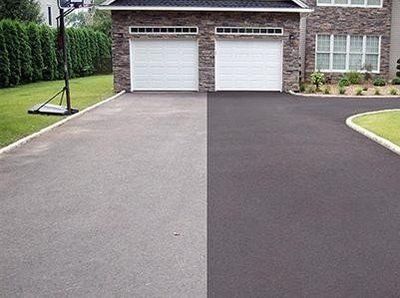Secure Surface Areas with Professional Asphalt Sealing: Cold Mix Basics
Secure Surface Areas with Professional Asphalt Sealing: Cold Mix Basics
Blog Article
Cold Mix Asphalt Vs. Hot Mix Asphalt: Which Is Right for You?

Structure Distinctions
Cold mix asphalt is generated by emulsifying the asphalt binder with water and an emulsifying agent before mixing it with accumulation. The warm mix asphalt production procedure entails warming the accumulation and asphalt binder individually prior to integrating them at the asphalt plant.
Furthermore, chilly mix asphalt has a tendency to be much less dense and more versatile than warm mix asphalt. This adaptability makes it better matched for locations with greater levels of movement, such as driveways or roadways with hefty traffic. On the other hand, hot mix asphalt is recognized for its high durability and resistance to rutting and cracking, making it a preferred selection for freeways and high-traffic roads where durability is important.
Installation Refine Variances
The procedure of installing cold mix and hot mix asphalt exhibits noteworthy variances in their demands and treatments. In comparison, warm mix asphalt necessitates an extra intricate installation process. Due to the home heating requirements, hot mix asphalt setups are typically brought out by specialists with specialized devices, guaranteeing an extra permanent and structurally sound result.
Durability and Longevity Factors
When considering asphalt options, sturdiness and longevity are vital aspects to assess for enduring sidewalk efficiency. Warm mix asphalt (HMA) is known for its exceptional longevity and durability.
In regards to longevity, HMA typically exceeds CMA due to its superior stamina and resistance residential properties. HMA pavements have a longer solution life, calling for much less regular repairs and upkeep, which can convert to set you back financial savings in the future. In addition, HMA sidewalks are a lot more quickly adjustable to satisfy details project requirements, even more improving their sturdiness.
Expense Considerations
Taking into consideration the economic implications is an essential aspect when evaluating the choice in between warm mix asphalt (HMA) and chilly mix asphalt (CMA) for pavement jobs. While the initial expense of hot mix asphalt is commonly higher than that of cold mix asphalt, recommended you read HMA often provides a more affordable solution in the lengthy run due to its premium sturdiness and longevity.
Along with material prices, it's important to think about the expenditures connected with setup and upkeep when comparing HMA and CMA. HMA generally needs customized equipment and proficient labor for correct installation, which can influence general task expenses. On the other hand, CMA is less complicated to collaborate with and can often be applied making use of less complex strategies, potentially decreasing setup expenses. Eventually, the choice in between HMA and CMA must consider not just the initial expense but also the long-lasting economic implications to figure out the most affordable alternative for the specific sidewalk task.
Environmental Influence Comparison
Comparison of the ecological effects between warm mix more information asphalt (HMA) and cold mix asphalt (CMA) reveals distinctive differences in sustainability techniques. HMA production calls for heats, leading to boosted power consumption and greenhouse gas exhausts. The process also launches unpredictable natural compounds (VOCs) and unsafe air pollutants (HAPs) into the ambience. On the other hand, CMA is generated and applied at lower temperatures, minimizing energy use and discharges considerably. The reduced manufacturing temperatures of CMA lead to lowered fuel usage and lower degrees of carbon dioxide discharges, making it a more eco-friendly choice.
In addition, making use of CMA often entails reusing existing asphalt pavement, advertising resource preservation and decreasing the quantity of waste sent to land fills. This recycling facet additionally improves the sustainability of CMA contrasted to HMA. Overall, when taking into consideration the ecological influence, CMA becomes a more environmentally sustainable selection due to its reduced power demands, minimized exhausts, and the capacity for recycling existing materials. By going with CMA over HMA, roadway building projects can add positively to environmental preservation initiatives.
Conclusion
To conclude, the option in between cold mix asphalt (CMA) and warm mix asphalt (HMA) depends on different factors such as structure, installment process, longevity, durability, price, and environmental effect. asphalt repair. While CMA provides a affordable and fast solution for minor repair services, HMA makes certain exceptional toughness and longevity for heavy web traffic locations. Take into consideration these elements meticulously to identify which sort of asphalt is the best selection for your paving requires

Thinking about the economic ramifications is a crucial element when evaluating the option in between warm mix asphalt (HMA) and cool mix asphalt (CMA) for pavement jobs. While the initial expense of warm mix asphalt is usually greater than that of cold mix asphalt, check my reference HMA commonly provides a much more cost-efficient service in the lengthy run due to its premium sturdiness and long life. cold mix asphalt.Comparison of the ecological impacts between hot mix asphalt (HMA) and chilly mix asphalt (CMA) discloses distinct differences in sustainability methods.In verdict, the selection between cold mix asphalt (CMA) and hot mix asphalt (HMA) depends on numerous variables such as composition, setup process, toughness, long life, cost, and environmental impact
Report this page